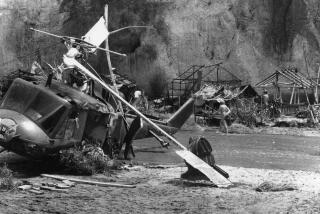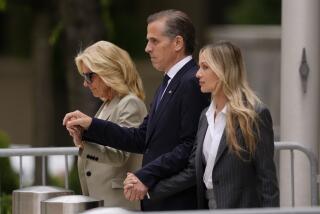Waco Jury Absolves U.S. in Cult Deaths
- Share via
WACO, Texas — A federal jury, after deliberating just 2 1/2 hours, found Friday that the government bore no blame for the fiery 1993 deaths of about 80 Branch Davidian cult members in what a government lawyer called “one of the most terrible and horrible events in our history.”
Although the jury’s verdict is only advisory and must be reviewed in coming weeks by a federal judge, the lead attorney for the Branch Davidian families conceded that “as a practical matter” a final ruling in favor of the government and against the families now seems to be a foregone conclusion.
The jury’s quick verdict, capping a monthlong trial, marked a potentially critical vindication for federal law enforcement authorities. Their credibility in the Branch Davidian disaster was shaken badly last year because of revelations that they had misled the public for years about the weaponry federal agents used during part of the 51-day siege that followed a shootout between federal agents and cultists and ended in a deadly conflagration.
Plaintiffs’ attorney Michael Caddell grudgingly acknowledged that “the vast majority of the American public will take this as the final word.”
More than 120 relatives of the Branch Davidians who died as their Mount Carmel compound burned, along with a handful of survivors, had sued the government for $675 million, claiming that its reckless tactics led to the tragedy.
U.S. District Judge Walter Smith, who has the power under federal law to accept or reject the jury’s verdict, said that he will rule later, possibly in the next few weeks.
Government attorneys said that, despite an ongoing investigation into the Davidian matter by special counsel John Danforth, appointed last year by Atty. Gen. Janet Reno, they hope that the ruling will convince many Americans that the blame for what happened at Mount Carmel rests squarely with David Koresh, leader of the religious sect.
After seven years of congressional investigations, criminal proceedings, books, documentaries and conspiracy theories, “it’s time to put this to rest and move on,” said U.S. Atty. Michael Bradford, who led the government’s defense.
The five-person jury heard four weeks of testimony, along with reams of often-contradictory depositions and videotapes and audiotapes that recounted critical moments in the standoff. Plaintiffs’ lawyers showed the jurors photographs and videotape of some of the 20 children who died, some of them toddlers who were burned or crushed.
But the jury rejected the Davidians’ claims across the board, finding that federal agents were liable for neither the initial shootout that started the standoff nor its deadly conclusion.
The federal Bureau of Alcohol, Tobacco and Firearms, which lost four agents in a shootout on Feb. 28, 1993, had not used excessive or indiscriminate force in trying to exercise arrest and search warrants against Koresh, the jury found.
Nor had the FBI been negligent in the final showdown on April 19, the jury found. It rejected claims by the Davidians that FBI agents, using tanks to try to pierce the compound with tear gas and force out the occupants, had started or helped spread the fire or had strayed from a plan approved by Reno.
Jurors did not want to speak about their verdict and were led out of the courthouse before it was read, Judge Smith said.
Caddell speculated that the Davidians’ cause was hurt by the government’s repeated testimony about the “arsenal” that Koresh had stockpiled at the compound, including about 50 illegal, fully automatic weapons.
Davidian attorneys said that sect members had the guns because they were in the business of selling them, but the government maintained that Koresh was out to wage a holy war with his arsenal, instructing his followers in military tactics to use against those who wanted to crush their religious faith.
Caddell said that his case was also hurt by final instructions that Judge Smith read to the jury, which the lawyer said lumped all the Davidians into a single group and failed to recognize that some sect members were less active--and less culpable--than Koresh and his top deputies.
Several dozen Davidians have been seeking to rebuild their church at the site of the tragedy, about 10 miles from the federal courthouse in Waco, and a few sect members and relatives of the victims watched with clear disappointment as the verdict was read.
Clive Doyle, a Branch Davidian who was tried and acquitted for his role in the siege, said outside the courtroom that he had predicted the jury’s verdict.
“I always thought the judge was prejudiced against us,” said Doyle, who now works in a health food store and is planning to move into a trailer at the Mount Carmel site. “It was always more about us being on trial than [the government].”
The Davidians were so disappointed that Caddell said he might drop one remaining part of the case. An infrared videotape would be shown at a hearing next month to help determine if FBI agents had fired shots toward the compound on the final day of the siege. Judge Smith scheduled the delayed hearing to allow time for a witness to return from abroad. But Caddell said that he does not want to fight a “lost cause.”
Before the jury returned its verdict, Caddell got a tongue-lashing from Smith on Friday morning. Caddell had suggested in comments to the media Thursday that the judge wanted to “engineer” a verdict.
Smith, clearly upset, said that Caddell “seems to have absolutely no understanding of the process” for the use of an advisory jury. He explained that under a law set by Congress placing severe limits on how the government can be sued, a judge can impanel an advisory jury, as he did, but that the final decision must rest with him.
“I can take [the jury’s] advice or I can reject it,” Smith said.
In closing arguments, both sides sought to leave the jury with a gripping impression.
Attorneys for the Branch Davidian relatives attacked federal authorities for their “reckless” tactics, while the government portrayed Koresh as a demonic figure who bears the blame for the tragedy.
Bradford, defending the federal government, told jurors that the children killed in the siege “should be alive today, ladies and gentlemen, and they would be alive today but for the actions of a man who thought he was Jesus Christ . . . and a group of followers whom he manipulated and dominated.”
But attorneys for the Davidians argued that federal authorities, frustrated by their negotiations with Koresh during the standoff, engaged in a dangerous strategy that all but doomed those inside the compound, leaving them no escape routes. They said that the occupants never wanted to kill themselves or set the compound on fire.
More to Read
Sign up for Essential California
The most important California stories and recommendations in your inbox every morning.
You may occasionally receive promotional content from the Los Angeles Times.













